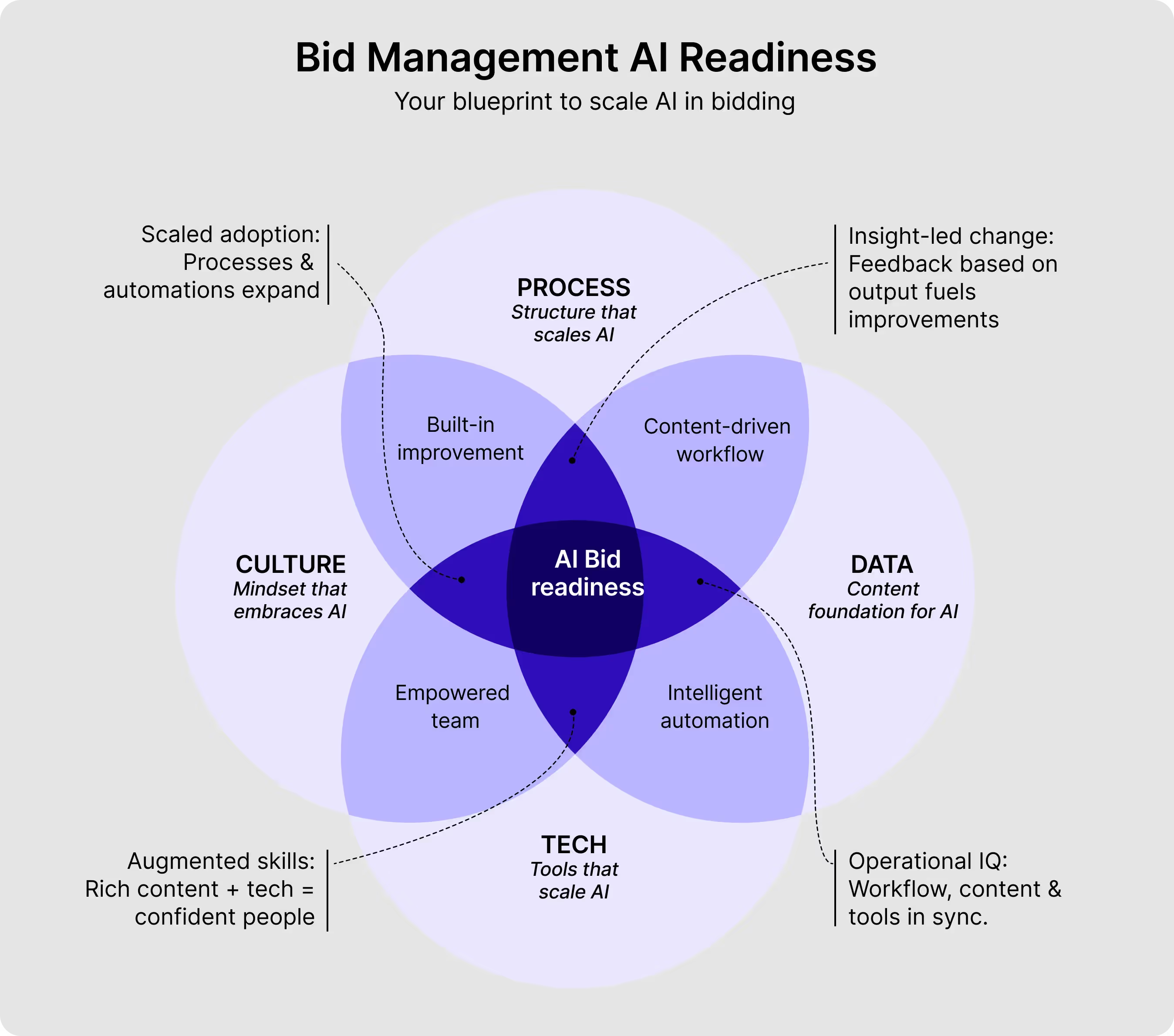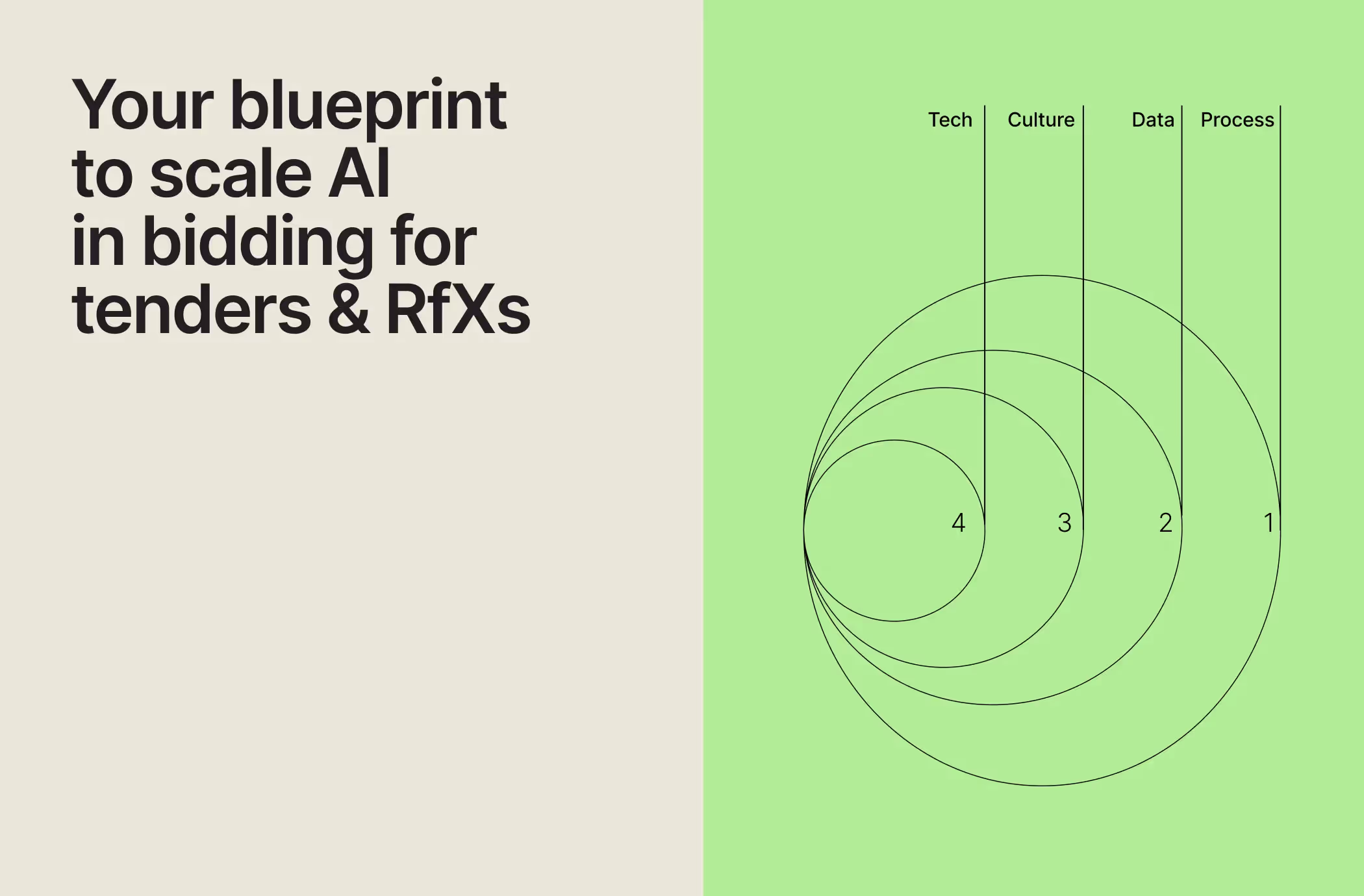AI in bid management is no longer optional. It’s a competitive necessity. Yet while interest has surged, many teams struggle to move from experiments to impact. Readiness is the missing link.
At Altura, we’ve worked with more than 150 bid teams across Europe. We’ve seen the gap between ambition and execution. And we’ve built a framework to help teams diagnose where they are, what’s blocking progress, and where to focus next.
This article covers:
- What AI readiness means for bid teams
- Common blockers to adoption
- What you need to get started
- Our four-pillar model of AI readiness
- A self-assessment quiz to benchmark your maturity
- A 90-day plan to build momentum
What is AI readiness?
AI readiness is the extent to which your bid team has the foundation to adopt and scale AI across workflows. It includes your structure, content, tools, mindset, and skills.
If you’re missing just one of those pieces, your pilots won’t land.
"AI readiness isn’t about tools. It’s about whether your team can turn those tools into results."— Matthijs Huiskamp, CEO & Founder, Altura

The four pillars of AI readiness in bid management
AI success relies on four interconnected capabilities:
1. Process: structure that scales AI
- Are bid workflows consistent?
- Are handovers documented?
- Can you spot where AI fits?
2. Data: content foundation for AI
- Is your proposal content structured, current, and tagged?
- Do you have feedback loops from Sales?
- Can AI access the content it needs?
3. Culture: mindset that supports AI
- Are people confident using AI?
- Do they know what’s allowed and encouraged?
- Is AI seen as useful or threatening?
4. Tech: tools that connect to workflows
- Are your AI tools integrated into daily work?
- Are outputs reviewed and improved?
- Does someone own the tools?
Common blockers to AI adoption
Across industries, we see three barriers that delay adoption:
1. Awareness
Teams don’t know what AI can (realistically) do for them. They hear about content generation but miss workflow use cases like requirement analysis or content retrieval.
2. Skills
Many lack prompting fluency or hands-on exposure. They don’t know what "good" output looks like - or how to get it.
3. Culture
There’s quiet resistance. AI feels risky. Without psychological safety, people either opt out or use AI in the shadows.
Take the quiz: how ready is your team?
Use our free AI readiness quiz to benchmark your maturity across the four pillars. It takes less than 5 minutes and gives you a tailored score with next-step guidance.
This quiz is based on Altura's real-world work with over 150 commercial teams.
What you need to start using AI in proposals
You don’t need perfect systems to begin. But you do need a functional baseline. Here’s what to check:
Proposal content
- 10+ past proposals from the last 12 months
- Approved templates for executive summaries, pricing, and methodology
- Clear value propositions or product descriptions
Qualitative input
- Win/loss feedback
- Bid/no-bid rationales
- Sales discovery notes (customer pain points, objections)
Documentation
- A shared bid process or playbook
- Roles and responsibilities per phase
- Evaluation criteria from past tenders
- An internal analysis of which bid activities take the most time or frequently delay delivery
Storage & access
- Central folder or workspace for proposals
- Basic tagging or naming conventions (by industry, product, or bid type)
- Shared access for Bid and Sales
Tools & permissions
- Access to general AI tools PAID versions (e.g. ChatGPT, Copilot)
- Use of integrated platforms like Altura for AI-supported bid workflows
- At least one person trained in prompting
- Internal policy or guidelines on acceptable use
If you can check 70% of these boxes, you’re ready to run a pilot.
Your 90-day plan to make AI work in bids
Use this timeline to move from idea to impact:
Days 1–30: assess and align
- Take the readiness scan
- Share results internally
- Identify top bottlenecks in your bid process
Days 31–60: pilot and track
- Choose one AI use case (e.g. RFP parsing, draft writing)
- Track time saved and quality of output
- Adjust prompts, templates, or tools based on feedback
Days 61–90: review and expand
- Document wins (metrics + real examples)
- Share a case study internally
- Identify 2 adjacent use cases to build momentum
Final word: readiness beats enthusiasm
Interest in AI is high. But readiness is rare. And that’s where most teams lose steam.
AI is not just a technology shift - it’s a structural one. The teams that win won’t be those who start fastest. They’ll be the ones who know what they’re building on.
→ Take the readiness scan. Pick one use case. Get started.









.png)


.avif)




